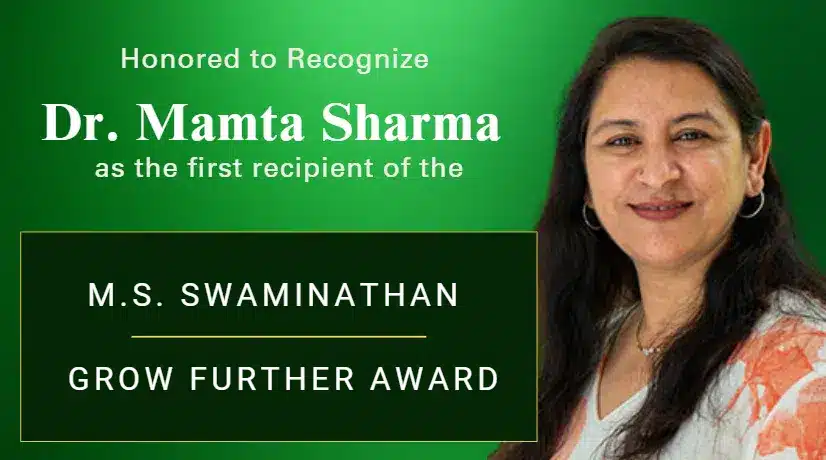The new M.S. Swaminathan-Grow Further Award goes to a celebrated plant scientist working to make India’s women-led smallholder farms more resilient to climate change.
Dr. Mamta Sharma is a senior scientist at the International Crops Research Institute for the Semi-Arid Tropics (ICRISAT). She’s also the regional director of ICRISAT’s Asia cluster and leads the organization’s precision phenotyping program, which investigates plants’ vulnerability to biotic and abiotic stress–anything from pests to drought that might hurt a crop.
Dr. Sharma works out of ICRISAT’s headquarters in Hyderabad. She holds a Ph.D. from the Dr. Y. S. Parmar University of Horticulture & Forestry and is an expert on diseases that inflict legumes, especially chickpea and pigeonpea.
“After completing my Ph.D., I moved to Hyderabad and consider myself privileged to join ICRISAT as a scientist,” Dr. Sharma told us. “Over time, I advanced to lead research in legumes pathology and climate change, focusing on crop production and protection with a strong commitment to supporting smallholder farmers.” She says her family played an important role in convincing her to continue her educational and scientific pursuits.
Per ICRISAT’s website, Dr. Sharma’s research focus includes “host plant resistance & phenotyping, host-pathogen interaction, population dynamics, pathogen characterization, disease detection and monitoring using next-generation tools, patho-genomics, disease epidemiology, climate change vis-à-vis pest/disease dynamics, disease forecasting models, as well as transfer of technology through integrated disease/pest management technologies.”
A long list of honors
The M.S. Swaminathan-Grow Further Award is only the most recent honor Dr. Sharma has received.
In 2012, she was awarded India’s Promising Young Scientist Award. She received a Doreen Margaret Mashler Award in 2017 and a Women Scientist of India Award in 2018. She’s also a two-time recipient of the Outstanding Partnership Award-Climate Change and Asia and has won the nation’s Exceptional Scientific Articles Award three times.
She’s credited with developing over 30 different varieties of legumes resistant to various crop diseases. It’s estimated that her work on climate resiliency training and capacity building has reached at least 40,000 farmers, particularly in regions where the farms are almost entirely dependent on seasonal rains.
Her work is especially beneficial to India’s women smallholders.
“My greatest career accomplishment has been contributing to the livelihoods of smallholder farmers, particularly in semi-arid tropics where legumes like chickpea and pigeonpea are vital crops,” she said. “With 40% of crop losses attributed to pests and diseases, as a plant pathologist, I always wanted to contribute to resource poor farmers, that’s where I focused on identifying seeds which are disease free and share with breeding programs to deploy in development of disease resistant and high yielding varieties in legumes.”
She says Grow Further’s work aligns perfectly with her own.
“I personally liked the Grow Further approach bridging the gap between research and adoption empowering local researchers,” she said. “[It] ensures farmer participation and accelerates delivery of practical solutions at the field level.”
Sharing knowledge with the world
Dr. Sharma also mentors the next generation of India’s agricultural scientists, training M.Sc. and Ph.D. candidates. Her knowledge and experience are available for all to take inspiration from—Dr. Sharma is the author of over 250 research papers and book chapters, according to ICRISAT.
Dr. Sharma is a renowned expert at helping farmers fight climate change.
Under a national directive, she was appointed to lead India’s Centre of Excellence on Climate Change Research for Plant Protection. Her efforts inspired the prime minister to establish a climate-focused research facility. Her expertise is enshrined in policy briefs published by the Ministry of Environment and the Ministry of Agriculture. She also regularly collaborates with scientists in Australia, the United States, and the United Kingdom on ways to develop better and more climate-resilient crop varieties.
Her contributions to the field are felt well beyond India. Crop varieties she has helped to develop are now growing nutritious food at farms throughout Asia, Africa, and even Australia.
Dr. Sharma tells Grow Further that her work securing better food security for her country and the world is far from over.
“India’s total food production has grown at a much faster pace than its population over the past few decades,” she said. “Today, however, India—and indeed the world—faces new and pressing food security challenges. Climate change, rising temperatures, greenhouse gas emissions, and frequent extreme weather events such as floods and droughts are disrupting the entire food chain, from production to markets. From a scientific standpoint, a critical challenge is ensuring the availability of quality, pest- and disease-free seeds to farmers.”
Former Indian Vice President Venkaiah Naidu presented the M.S. Swaminathan-Grow Further award, which comes with a $25,000 research stipend, to Dr. Mamta Sharma at a special event hosted by the M.S. Swaminathan Research Foundation earlier this month. Grow Further’s CEO Peter Kelly and Vice President Venkat Pegadaraju were there to celebrate the moment.
Dr. Sharma expressed her thanks for being chosen by the jury and Grow Further, and admits the award was unexpected.
“I first learned about this award while attending the Plant Health Conference in Hawaii, ‘Global Communities Collaborating to Address Global Risk,” she said. “It was a pleasant and inspiring surprise to receive the news in the midst of engaging scientific discussions.”
— Grow Further
Photo credit: Dr. Mamta Sharma of the International Crops Research Institute for the Semi-Arid Tropics (ICRISAT). Photo courtesy of ICRISAT.

